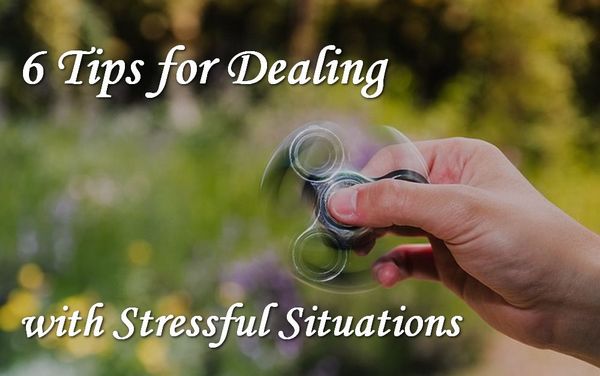Everyday life is full of stress, big and small, which makes our day more difficult in several ways. When you’re faced with several stressful situations at once, or have just been given one too many things to think about, it’s easy to become overwhelmed and start to lose the ability to sort things out in an efficient way.
While some stress is normal, and can actually help you stay focused, too much stress is bad for your health, both physically and mentally, so it’s important to find ways to cope with it.
If you are currently struggling to deal with one or more stressful situations, here are some tips to help you get through this difficult time.
Take a positive view
The worst thing about stress is that it can make a bad situation seem so much worse. The best way to counter this is to take a positive outlook. Instead of thinking ‘everything is going wrong’, tell yourself ‘there is a solution’ or ‘everything will be fine’.
The worst thing you can do in an already stressful situation is panic, because that will only hinder your ability to deal with all the details efficiently.
Calm your mind by slowing your breathing, and think about situations in which you have overcome adversity. Try moving to a neutral, calm place for a few moments to clear your mind and allow yourself to think clearly again.
Remember to put things in perspective; Your situation may seem bad, but once you take a step back, you’ll realize that it may not be as bad as it first seems.
Practice gratitude for everything else in your life that is going well, and visualize positive outcomes for your situation.
Organized
One of the biggest contributors to stress is disorganization. When you leave things until the last minute and are not ready, then you increase your chances of making a mistake.
A good example of this is leaving for work late at night, rushing out of the house on short notice, and leaving all the important paperwork for a morning meeting on the kitchen table. By is being setplanning ahead, and giving yourself enough time to cool off, you automatically reduce the chances of experiencing stress.
Likewise, if you’re already coping with stress, organization can be your key escape. Make a list of everything you need to do, then prioritize each task in order of importance.
This will help you get everything you need done done, and you won’t feel as much pressure to rush to the next task, because you’ll know you’re doing the most important tasks first.
Find Solutions
Instead of focusing on what you can’t fix, start by dealing with situations you can control. Do not rush into decisions, take time to make an action plan. This will help you ensure you make the best decision.
The important thing is to be firm, because the longer you think about possible solutions, the longer you will allow the stress to continue.

Come up with short-term and long-term solutions: not everything can be fixed right away, but there are quick fixes that can be used, until you can implement a better solution. For example, if your car breaks down, the short term solution is to find another means of transportation.
The long term plan might be to get a loan from a reputable company, eg Bonsai Finance, and fix the car. Once you start planning and taking action, you will feel the stress start to fade, because being proactive will give you reassurance.
Ask for help
It’s common for people to feel as though they need to handle difficult situations on their own, but it’s important to remember that you don’t have to do everything alone. If you are struggling and need advice, then there is nothing wrong with asking for help and support from those around you.
Some people may be able to offer you practical help, so you can solve the problem as quickly as possible. If not, there will be others within your friends and family, who will be able to provide support and emotional reassurance, making whatever you’re going through much easier to handle.
Find coping strategies
Whatever you experience, there is coping strategy which can help reduce the effects of stress. Being stressed can cloud your judgment, and lead to further health problems, both emotional (e.g. anxiety and depression) and physical (e.g. illness, physical exhaustion, etc.).
Taking time for yourself, and letting your mind and body recharge is important, so try and take some time to let yourself relax and do something you enjoy. There are simple practices you can use to relieve stress, such as meditation, breathing exercises and the art of mindfulness.
Try new things, and see which techniques work best for you. Whichever strategy you choose, make sure it’s something you feel relaxed about; after all, there’s no point trying to meditate if you feel uncomfortable in the process.
be prepared
The best thing you can take from this experience is to learn from it and avoid similar situations in the future. While you can’t prevent stress, you can be prepared for it, and plan for the unexpected.
Make sure you do the simple things, like have a backup of your computer data stored on a separate device and keep an emergency first aid kit accessible at your home and work. Keep items in your car that will help you if you break down or get lost somewhere, such as tools, money or emergency food, and a high-visibility jacket.
Preparation is key to reducing the amount of stress such a situation can cause








